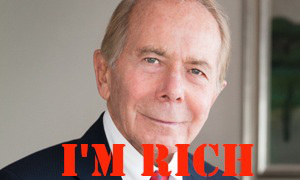Former AIG CEO Loses Bid To Sue Fed Over Bailout
Greenberg exited AIG back in 2005 but whose company Starr International continued to invest in the company, holding up to 12% of AIG shares at one point.
He is now involved in two lawsuits, one filed against the Federal Reserve and another against the federal government. Today’s ruling from the 2nd U.S. Circuit Court of Appeals in New York involves the Fed case.
The plaintiffs alleged that the New York Fed breached its fiduciary duty under Delaware law (AIG is incorporated in Delaware) to AIG’s shareholders during the bailout and that shareholders were cheated out of tens of billions of dollars. The complaint also accuses the Fed of overstepping its authority by allowing the U.S. Treasury to take control of nearly 80% of the without a shareholder vote.
In late 2012, a U.S. District Court ruled against Greenberg and his fellow plaintiffs, saying that the Fed acted within its authority to prevent the collapse of one of the nation’s largest financial institutions.
Today’s ruling from the appellate panel affirms the decision of the lower court.
Writing for a court, Judge John Walker Jr. explained the the bailout, which was intended “to rescue AIG from bankruptcy at the height of the direst financial crisis in modern times” fell within the Fed’s power to act in “unusual and exigent circumstances.”
The court also held that applying Delaware state law in this instance would set a precedent that could negatively impact the Fed’s ability and obligation to act in the public interest in the future.
“In this case,” writes Walker, “Delaware fiduciary duty law cannot be applied to [the Fed]’s rescue activities consistently with adequate protection of the federal interests at stake in stabilizing the national economy.”
Still ongoing is the suit, filed in 2011, by Greenberg and other investors against the U.S. government.
That claim alleges that that the government violated shareholders’ rights under the Fifth Amendment. The plaintiffs claim that the government used its authority to illegally acquire their private property (in the form of AIG shares) for public use without providing just compensation. For that, they were seeking $25 billion. That case is currently before the U.S. Court of Federal Claims in D.C.
Shortly after paying back the bailout money, the AIG board briefly considered hopping on board the suit against the government.
This news resulted in an immediate backlash from the public and lawmakers, who politely requested that AIG not even think about throwing its hat into the ring on this one.
Perhaps out of respect to the government that had saved it from the collapse it so rightly deserved, the board quickly nixed the notion of signing on as a plaintiff, letting Greenberg, et al, continue on their own.
Ex-AIG CEO loses appeal of bailout lawsuit vs. N.Y. Fed [Reuters]
U.S. Appeals Court Upholds Dismissal of Suit Challenging AIG Bailout [WSJ.com]
Want more consumer news? Visit our parent organization, Consumer Reports, for the latest on scams, recalls, and other consumer issues.


